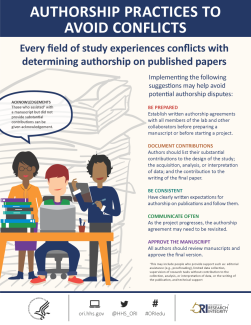- Ensure fair authorship among research collaborators
- Reduce worries about authorship among the research team
- Avoid authorship discussions in the future
- Avoid stressful disputes of authorship
- It is smart and preemptive
“Conflicts over authorship and a host of other issues also erupt among collaborating scientists who are peers. In the worst situations, not only does the research project suffer, but investigators also wind up leveling accusations against one another, sometimes through formal, adversarial mechanisms”.
“Most often, problems arise in scientific collaborations because the scientists failed to explicitly define their expectations of one another. We believe that framing a partnering agreement at the outset of the research project can help enormously in setting the collaboration on a solid footing. Ideally, the agreement spells out exactly what the roles and contributions of each scientist will be and provides a mechanism for decision making for major issues such as authorship, additional collaborations, and the sharing of biological materials”.
Gadlin, H., & Kevin Jessar. (n.d.). Preempting discord: Prenuptial agreements for scientists. The Office of Research Integrity. Retrieved March 24, 2023, from https://ori.hhs.gov/preempting-discord-prenuptial-agreements-scientists


